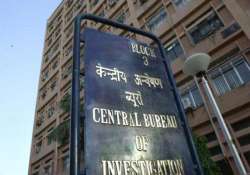Gauhati High Court referred 10 cases to CBI during last 4 yrs
New Delhi: The Gauhati High Court, which had declared CBI to be an unconstitutional body, had referred nearly 10 cases to the agency in the last four years for carrying out investigations.Four cases in 2010

New Delhi: The Gauhati High Court, which had declared CBI to be an unconstitutional body, had referred nearly 10 cases to the agency in the last four years for carrying out investigations.
Four cases in 2010 and two each in 2011, 2012 and 2013 have been referred to CBI by other benches of the High Court, the agency's data shows.
The cases referred to by the High Court range from alleged violation of human rights, anomalies in teacher's recruitment in Meghalaya, irreregularities in land aquisition for trans-highway project among the some important ones.
In January this year, the then Chief Justice A K Goel and Justice Arup Kumar Goswami had ordered a CBI probe into allegations against an Assam minister that he had branded two sisters as witches and harassed them in a bid to grab their land in Karbi Anglong district.
Last year, Justice P K Musahary had directed CBI probe into alleged irregularities in land valuation and disbursement of compensation for land acquired for the trans-Arunachal highway.
In the same year, Justice Subhasis Talapatra had directed the state government to hand over probe into the murder of the editor of ‘Aji', an Assamese daily, Anil Majumdar, who was shot dead by unidentified gunmen in 2009.
CBI officers were surprised to hear the recent order of the High Court which said CBI is neither an organ nor a part of the Delhi Special Police Establishment (DSPE) and CBI cannot be treated as a ‘police force' constituted under the DSPE Act, 1946.
The judgement by the division bench, comprising justices I A Ansari and Indira Shah, came on a writ petition filed by one Navendra Kumar challenging an order by a single judge of the High Court in 2007 on the resolution through which CBI was set up.
The Bench in its order set aside and quashed the resolution, dated April 1, 1963 whereby CBI was constituted. It said “the actions of the CBI, in registering a case, arresting a person as an offender, conducting search and seizure, prosecuting an accused etc. offend Article 21 of the Constitution and are, therefore, liable to be struck down as unconstitutional.”
The court, however, said quashing of the proceedings that are pending in the CBI court would not be a bar to any further investigation by police having jurisdiction over the subject-matter.
CBI Director Ranjit Sinha said “we are studying the order of the Gauhati High Court and will submit our opinion to Department of Personnel and Training. We are definitely seeking an urgent action on the situation”.
Four cases in 2010 and two each in 2011, 2012 and 2013 have been referred to CBI by other benches of the High Court, the agency's data shows.
The cases referred to by the High Court range from alleged violation of human rights, anomalies in teacher's recruitment in Meghalaya, irreregularities in land aquisition for trans-highway project among the some important ones.
In January this year, the then Chief Justice A K Goel and Justice Arup Kumar Goswami had ordered a CBI probe into allegations against an Assam minister that he had branded two sisters as witches and harassed them in a bid to grab their land in Karbi Anglong district.
Last year, Justice P K Musahary had directed CBI probe into alleged irregularities in land valuation and disbursement of compensation for land acquired for the trans-Arunachal highway.
In the same year, Justice Subhasis Talapatra had directed the state government to hand over probe into the murder of the editor of ‘Aji', an Assamese daily, Anil Majumdar, who was shot dead by unidentified gunmen in 2009.
CBI officers were surprised to hear the recent order of the High Court which said CBI is neither an organ nor a part of the Delhi Special Police Establishment (DSPE) and CBI cannot be treated as a ‘police force' constituted under the DSPE Act, 1946.
The judgement by the division bench, comprising justices I A Ansari and Indira Shah, came on a writ petition filed by one Navendra Kumar challenging an order by a single judge of the High Court in 2007 on the resolution through which CBI was set up.
The Bench in its order set aside and quashed the resolution, dated April 1, 1963 whereby CBI was constituted. It said “the actions of the CBI, in registering a case, arresting a person as an offender, conducting search and seizure, prosecuting an accused etc. offend Article 21 of the Constitution and are, therefore, liable to be struck down as unconstitutional.”
The court, however, said quashing of the proceedings that are pending in the CBI court would not be a bar to any further investigation by police having jurisdiction over the subject-matter.
CBI Director Ranjit Sinha said “we are studying the order of the Gauhati High Court and will submit our opinion to Department of Personnel and Training. We are definitely seeking an urgent action on the situation”.